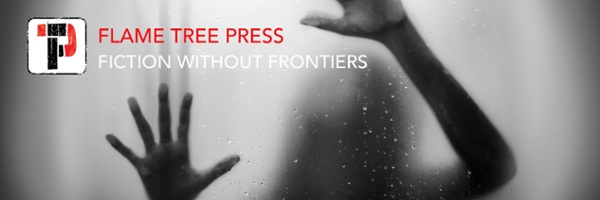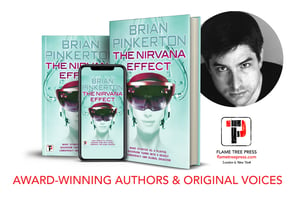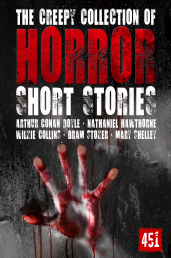In this month's author Q&As we have Brian Pinkerton, author of The Nirvana Effect. Hear more about the novel, what draws him towards writing dark fiction and what his approach is to creating fictional characters.

How did you get started writing?
My mother was a high school English teacher. When I was young, she took me on regular trips to the local library, and I would come home with stacks of books. I knew at a young age that I wanted to write my own stories.
My grandfather was a newspaper publisher in Steuben County, Indiana. He also owned a local printing press, so growing up, we always had supplies of paper all over the house. I would use them to create books, without breaking the binding. Each pad was its own book. I would write the stories and also draw the illustrations. I loved the art of Maurice Sendak and Jack Kent. I also loved comic strips like Peanuts and B.C. I wanted to be a cartoonist.
How has cartooning influenced your approach to novel writing?
Mainly in my methods to capturing my creativity. To this day, I still love the experience of handwriting stories. I handwrite all my novels. I don’t start them on the computer. In this day and age, people find that very strange. But for me, it frees up my creativity. Just a pen and a blank page.
On the computer, it’s too neat and linear. I feel like every sentence has to be perfect out of the gate. But when I’m scribbling on a pad, I’m free. It’s like sketching with words.
The computer also has too many distractions. I want to check my email. I want to go on social media. I go wandering and don’t come back.
I actually write on a big drawing table in the basement. No distractions. It’s just me, the furnace, the washer and dryer, and spiders. And a very big cup of coffee.
What was your first novel?
I wrote my first novel when I was very young. I enacted the entire plot with the Fisher Price Little People Village and then wrote it all down as quickly as I could remember it. I still have that manuscript somewhere. It was written on lined, three-hole-punch paper. The pages were tied together with string. The title was “Deadly Adventure.” It even had a theme song.
What author has most influenced you, and why?
There are two writers who inspired me the most. Richard Matheson was an amazing storyteller with a knack for strange and surprising tales grounded in everyday people and settings. William Goldman influenced me through his writing style – brisk, exciting and full of personality. He was able to write successfully across a wide range of genres – including literary, thriller, western, romantic fantasy and historical. He wrote novels, screenplays and nonfiction, always in a compelling voice. Both Matheson and Goldman were very prolific and productive. They didn’t coast on one famous work.
Is your writing spontaneous or do you outline?
I definitely outline my books in advance. I like to create stories with intricate plotting and twists and turns with a deliberate rhythm. I want to pace when certain things are revealed. I like to build to a big finish that brings all the threads together. I hate writing into dead ends. I like my writing to be fast and efficient. I don’t want to throw out huge chunks of work because the story took a wrong turn.
I use index cards and a folder stuffed with scraps of paper with notes and ideas for memorable scenes and ways to link them together.
People ask if it ruins the fun of discovery for me, since I know how everything will turn out as I’m writing. The truth is that although I know where the story goes, I’m never sure of how the characters will react. For me, the fun and spontaneity is the response and development of the characters to the crazy situations I put them through.
What draws you to writing dark fiction?
I like building tension and suspense. It’s just fun to send readers on a rollercoaster ride. Sometimes it’s psychological, sometimes it’s more action-driven. Often, like in The Nirvana Effect, I inject some social commentary about the state of the world, creating allegories with real issues and events.
Sometimes I include humor, which naturally arises out of tense situations. It’s like a relief valve.
I’ve written in the thriller, sci-fi and horror genres, but my approach is pretty consistent: I want to tell stories about ordinary people who get caught up in extraordinary situations. Often they are things that scare me. I give life to my demons and then I kill them.
In The Nirvana Effect, the fear is technology taking over our lives, the explosion of personal data tracking our every move, the loss of privacy and our personal freedoms.
What’s your approach to creating characters?
I want people to really identify with my main characters. Then I take them on a wild journey. I want the reader to think, “What would I do in this situation?”
My first goal is to engage the reader emotionally, to take a sympathetic character and thrust them into a crisis that might include their first encounter with crime or violence. My lead characters are regular people: teachers, office employees, working mothers, construction workers, book store clerks… The lead character in The Nirvana Effect is a California landscaper.
How would you describe your writing style?
My goal is momentum. I want the writing to be crisp, clear and easy to follow so your eyes glide down the page. I want the reader to be constantly engaged by a feeling of “What happens next?” I love ending chapters with cliff hangers. I love cross-cutting between two plot threads of suspense. I want to create situations where you wonder, “How will they escape?” “How will they survive?” “How can this bad guy be stopped?”
When I edit my own work, I’m constantly tightening. Eliminating unnecessary words. Deleting adverbs, strengthening verbs. Fewer words but more impactful words. My vocabulary is relatively simple. I’m not trying to show off with gratuitous verbosity or send people in search of a dictionary. That pulls the reader out of the story. My books are entertainment, a relief from day-to-day drudgery. They shouldn’t be a chore to read.
If there’s any sophistication or attempt to be clever, it’s in the subtext, but not bogging down the sentences. I like sneaking in social commentary and satire into my books, but it’s always under the surface.
Did you study writing?
Writing has always come naturally. And that’s probably because I read a lot as a child. I was a shy kid and preferred to express myself in writing rather than in social situations.
At the University of Iowa, I took undergraduate classes of the Iowa Writers Workshop, one of the oldest and most prestigious writing programs in the country. One of my teachers was the fiction editor of Esquire magazine. I remember he liked my literary attempts but rolled his eyes when I wrote a mystery story. He said, “Well, I guess that sort of thing is okay if you aspire to write for Alfred Hitchcock’s Mystery Magazine.” I remember thinking, “Yes, I do!” I also took American Literature classes from David Morrell, who wrote First Blood and created the character Rambo.
After Iowa, I attended Northwestern University’s Medill School of Journalism and got a master’s degree. It helped me stretch my writing skills so I could make a living with it. Not all my writing is fiction. I have a job writing for a local corporation. It helps my keep my fiction writing sharp and vice versa. A lot of the underlying requirements are the same: clear, compelling, technically accurate prose to engage a reader.
Are you related to the Pinkerton Detective Agency?
I get asked that a lot, because I have written mysteries. People ask if Pinkerton is a pen name but no, it’s really me.
Allan Pinkerton was the first private eye and founded the first detective agency. He was a spy for President Lincoln in the Civil War. He hunted Jesse James. I don’t know if I’m a direct descendant but it’s very likely we have common ancestry in Scotland.
I don’t feel that it influences the type of books I write. In fact, aside from Killing the Boss, my books don’t focus much on the detective or investigation. My themes are more Hitchcock-like…. innocent people who become entangled in crimes.
Is writing hard work or does it come easy?
Both! It’s very time consuming and challenging and can make my brain hurt, but I love it. It’s exhilarating.
Writing a novel is like going on a vacation. You get to visit new places, meet new people, have some adventures and excitement, and then return to the safety of home. The blank page is my passport.
Why do you write?
It’s a compulsion. Over the years, it has become as natural as eating or sleeping. I just do it. Sometimes it’s to express a particular mood. It can be therapeutic that way. Other times it’s just the thrill of constructing an exciting story. I love to twist the plot and surprise readers. I suppose it all comes down to a feeling of accomplishment and creation. It’s a basic human need to make stuff, to leave our mark.
Thank you!
Thank you to Brian for taking the time to talk today about The Nirvana Effect. You can pick up his book from the 20th April. It will be available in paperback, hardback and ebook. Check out our website for details.
 Brian Pinkerton tells stories to frighten, amuse and intrigue. He is the author of novels and short stories in the thriller, horror, science fiction and mystery genres. His books include The Gemini Experiment, Abducted (a USA Today bestseller), Vengeance, Anatomy of Evil, Killer's Diary, Rough Cut, Bender, Killing the Boss and How I Started the Apocalypse (a trilogy). Select titles have also been released as audio books and in foreign languages. His short stories have appeared in PULP!, Chicago Blues, Zombie Zoology and The Horror Zine.
Brian Pinkerton tells stories to frighten, amuse and intrigue. He is the author of novels and short stories in the thriller, horror, science fiction and mystery genres. His books include The Gemini Experiment, Abducted (a USA Today bestseller), Vengeance, Anatomy of Evil, Killer's Diary, Rough Cut, Bender, Killing the Boss and How I Started the Apocalypse (a trilogy). Select titles have also been released as audio books and in foreign languages. His short stories have appeared in PULP!, Chicago Blues, Zombie Zoology and The Horror Zine.
Brian has been a guest author and panelist at the San Diego Comic Con, American Library Association annual conference, World Horror Convention and many other literary and genre events. His screenplays have finished in the top 100 of Project Greenlight and top two percent of the Nicholl Fellowship of the Academy of Motion Picture Arts and Sciences. Three of the scripts have been compiled in a collection, Unreleased.
Brian received his B.A. from the University of Iowa, where he took undergraduate classes of the Iowa Writers Workshop. He received his Master's Degree from Northwestern University's Medill School of Journalism.
Brian lives in the Chicago area and invites you to visit him on Facebook, Goodreads, Twitter and at www.brianpinkerton.com. Brian is also a cartoonist and his web site includes his deranged cartoon series, The Ruts.




